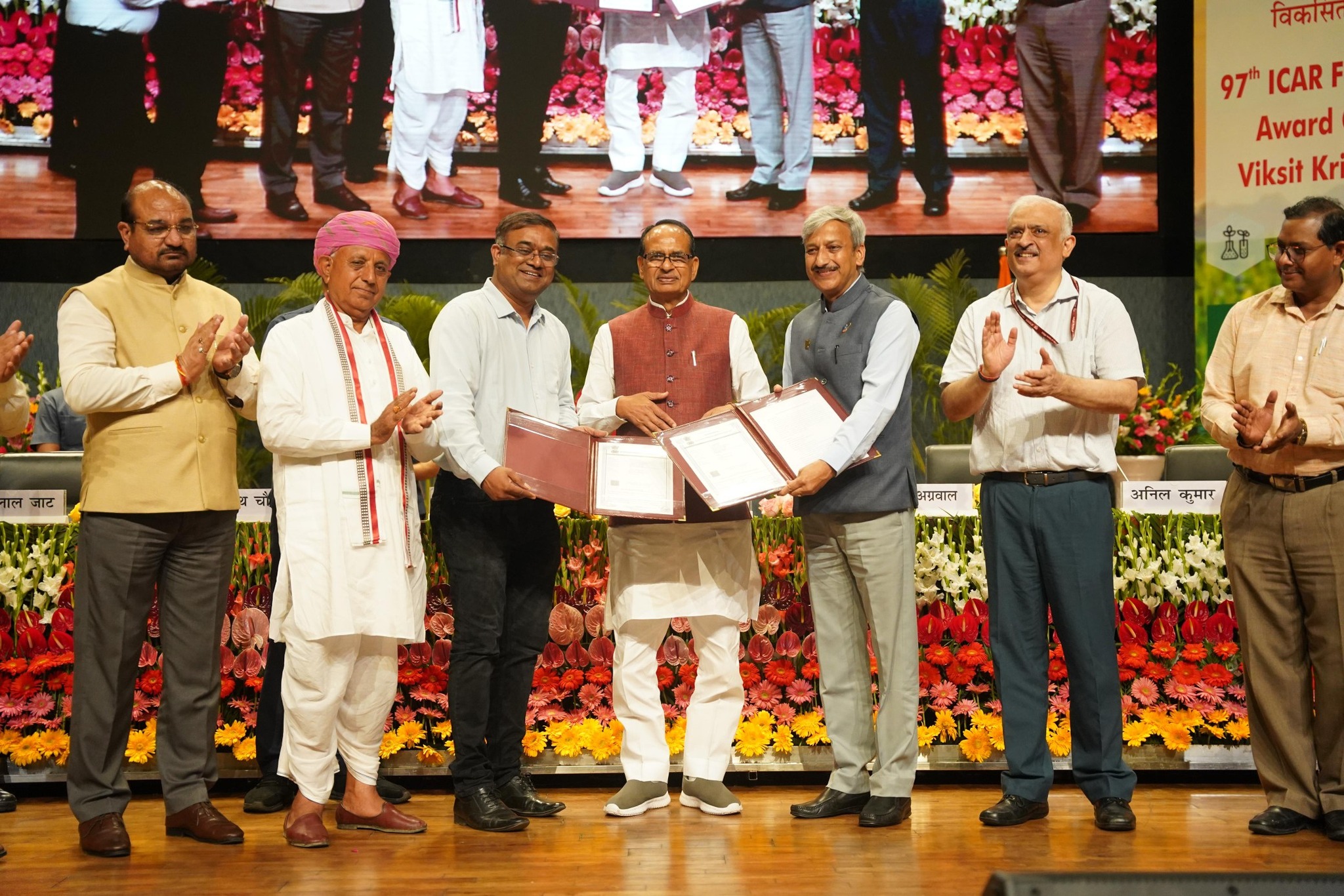ICAR Foundation Day Celebrated with Awards, Innovations, and Agri Reforms
In his keynote, Shri Shivraj Singh Chouhan extended heartfelt congratulations to the entire ICAR fraternity, noting that their scientific contributions have not only benefited Indian farmers but also enhanced India's agricultural exports and global standing.

- Country:
- India
In a grand celebration marking the 97th Foundation Day of the Indian Council of Agricultural Research (ICAR), Union Minister for Agriculture, Farmers Welfare and Rural Development, Shri Shivraj Singh Chouhan, delivered a powerful address at the Bharat Ratna C. Subramaniam Auditorium, NASC Complex, Pusa, New Delhi. The event was attended by a host of dignitaries, including Union Minister of State for Agriculture Shri Bhagirath Choudhary, Secretary of MoA&FW Shri Devesh Chaturvedi, ICAR DG Dr. M.L. Jat, scientists from across India, and hundreds of farmers.
The day witnessed the conferral of National Agricultural Science Awards, inauguration of the ‘Viksit Krishi Exhibition’, the release of 10 new agricultural publications, and signing of multiple MoUs to boost research collaborations—symbolizing ICAR’s steadfast commitment to making Indian agriculture more resilient, productive, and farmer-centric.
A Celebration of Scientific Excellence and National Gratitude
In his keynote, Shri Shivraj Singh Chouhan extended heartfelt congratulations to the entire ICAR fraternity, noting that their scientific contributions have not only benefited Indian farmers but also enhanced India's agricultural exports and global standing.
He emphasized that ICAR’s contributions directly support over 800 million people through the Public Distribution System, calling the institution’s Foundation Day a national festival of gratitude for the scientific community.
Describing scientists as modern-day rishis, the Minister lauded their dedication to farmer welfare, asserting that their research has played a critical role in securing India’s food sovereignty and in transforming Indian agriculture from a crisis-ridden sector to a growth engine.
India's Agricultural Transformation: Record Growth Under PM Modi
Citing official data, Shri Chouhan provided a compelling overview of India’s record-breaking agricultural growth:
-
Annual foodgrain production growth:
-
Green Revolution era (1966–1979): 2.7 million tonnes
-
1980–1990: 6.1 million tonnes
-
2000–2014: 3.9 million tonnes
-
2014–2025: 8.1 million tonnes per year
-
-
Horticulture production:
-
1966–1980: 1.3 million tonnes/year
-
1990–2000: 6 million tonnes/year
-
2014–2025: 7.5 million tonnes/year
-
-
Milk production:
-
2000–2014: 4.2 million tonnes/year
-
2014–2025: 10.2 million tonnes/year
-
These figures, the Minister emphasized, reflect 2.5 to 3 times higher output growth in the past decade, showcasing how sustained government support and scientific innovation have revolutionized agriculture.
Addressing Contemporary Challenges with Innovation
While acknowledging the tremendous gains, Shri Chouhan didn’t shy away from the sector’s challenges—climate change, fragmented landholdings, pest outbreaks, and difficulties in livestock management. He emphasized that these must be met head-on with research-backed, farmer-driven solutions, urging ICAR to lead a second agricultural revolution grounded in natural farming, sustainability, and technology.
He called for:
-
Enhancing per-hectare productivity of pulses and oilseeds
-
Development of compact, affordable farm machinery for smallholders
-
Portable fertilizer testing kits for field use
-
Extended shelf life for perishable produce
-
Research driven by ground-level farmer needs
-
Natural farming methods for ecological sustainability
Viksit Krishi Sankalp Abhiyan and Future Agenda
The Minister praised the Viksit Krishi Sankalp Abhiyan—a nationwide outreach initiative that has surfaced 500 critical research areas. He stated that crop-specific consultations, such as those held for soybean and cotton, would soon expand to sugarcane and maize.
He voiced concern over declining cotton yields despite new varieties, noting that Bt cotton is increasingly vulnerable to viral attacks. He urged ICAR to prioritize research in this domain and ensure that research agendas emerge from grassroots consultations, not just academic institutions in Delhi.
To this end, he proposed a new governance model—“One Team, One Goal”—for agricultural research. He called for dedicated scientific teams focused on specific issues, collaborating across institutes and states to address challenges more effectively.
Reforms in Agricultural Inputs and Farmer Protection
Addressing systemic exploitation in the agri-input market, Shri Chouhan announced several bold reforms:
-
Toll-free grievance helpline for farmers to report fraud or substandard products
-
Crackdown on unregulated bio-stimulants—over 30,000 unauthorized products identified
-
Letters sent to all Chief Ministers urging decisive action against such malpractice
-
Proposal to establish low-cost fertilizer outlets, akin to Jan Aushadhi Kendras for medicines
-
Ethical vetting of seed and input pricing in all ICAR MoUs with private companies
The Minister emphasized that no farmer should be pressured to buy non-essential or overpriced inputs, pledging strict penalties against fraudulent actors.
A Vision for Global Research Collaboration and Domestic Empowerment
Shri Chouhan highlighted India’s growing stature in global agri-research and its increasing role in international food security and climate resilience. He welcomed the expansion of ICAR’s partnerships with other countries and research bodies, urging them to remain grounded in farmer-centric values.
He also urged scientists to work not just for research publications or academic milestones, but for “yajna”—a sacred offering in service of society.”
Concluding his remarks, he invited ICAR and its scientists to reaffirm their oath to stand by the farmers of India and to carry forward the dream of a Viksit Bharat (Developed India) by 2047, where agriculture becomes profitable, resilient, and globally competitive.
With this year’s Foundation Day celebration, ICAR not only reflected on its storied legacy but also charted a progressive, inclusive, and innovation-driven roadmap for the future. As India's agricultural landscape evolves, institutions like ICAR will remain pivotal in bridging the gap between lab and land, and in ensuring that every Indian farmer thrives with dignity and prosperity.
- READ MORE ON:
- ICAR Foundation Day
- Shivraj Singh Chouhan
- agricultural innovation
- farmer welfare
- natural farming
- foodgrain production
- horticulture growth
- dairy sector
- Viksit Bharat
- agri-input reform
- ICAR research agenda
- MoUs
- Viksit Krishi Sankalp Abhiyan
- bio-stimulants crackdown
- NEP 2020
- grassroots-driven science










